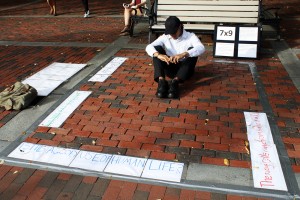
Umoja, Boston University’s Black Student Union, hosted a “Solitary Confinement Performance Art Project” Wednesday in front of the George Sherman Union to raise awareness for prison reform efforts.
For the project, students and faculty members took turns sitting in a 7 feet by 9 feet cell outlined on the ground out of duct tape. In order to demonstrate the reality of solitary confinement cells, demonstrators did not have access to entertainment or interaction with passersby.
“We use solitary confinement more than any other country, and prisoners are staying in this state of solitary confinement for months and even years at a time,” said Rosa Otieno, one of the students creating a BU Students for Prison Reform group on campus. “And it has devastating effects on people’s mental health and overall health status.”
Otieno, a senior in the College of Arts and Sciences, said she is forming the group to start a dialogue on prison reform and the tactics being used in U.S. prisons.
Students at other colleges and universities in the Northeast, including Harvard University, Yale University, Brandeis University and Suffolk University held similar demonstrations as part of the larger organization, Student Alliance for Prison Reform. The 23-hour vigil took place at various campuses from 7 p.m. Tuesday to 6 p.m. Wednesday with some schools participating for the full time and others for a portion of the day.
Solitary confinement as a form of punishment was mostly discontinued in the United States in 1890, after the U.S. Supreme Court found the practice attributed to mental illness, according to information posted next to the project from the American Friends Service Committee. The practice was reintroduced in the 1980s during the federal push against the “War on Drugs.”
Rev. Dr. Michelle Walsh said the inhumanity of solitary confinement is one of many problems with the U.S. prison system. She said she spent about 30 minutes in the cell space.
“Once people become part of the prison system, they lose all kinds of rights,” said Walsh, a professor in the School of Social Work. “Not just being in the prison system itself, but when they come out, they lose access in most states to being able to vote, access to housing, access to all kinds of things that would even enable them, in terms of rehabilitation, to reenter society successfully.”
After observing the demonstration, Baptiste Fassin said he agrees solitary confinement is a major flaw in the U.S. justice system.
“If your system has one aspect of it that puts people in this very confined cell, where you spend [23] hours…without any light, without any social interaction…that shows how repressive you’re willing to go to oppress people,” Fassin, a senior in CAS, said. “It really shows that the judicial system is very much about repression and not about rehabilitation.”
Walsh said she was surprised by the lack of attention passersby gave the demonstration.
“What really struck me was how even with somebody sitting here in a marked-off space with material around, people don’t stop to look,” she said. “We just walk right by and walk right through.”
Fassin also noted the lack of attention from students and pedestrians.
“I see a lot of people just ignoring it,” he said. “But that always happens when you have this kind of demonstration. It’s sad because I think it’s a very worthy project.”
Another observer, Katherine Sennott, a CAS junior, said it would be difficult to dedicate time to prison reform as an already preoccupied student.
“I wish it could be as simple as, ‘Yes, now I will designate 10 hours a week to doing this,’ but I’m a biology major, so it’s on the list of, I’m not even exaggerating, 100 different things I should be doing,” she said. “But you can’t do them all. But I will definitely look into it.”
Walsh said the demonstration was a good first step in bringing prison reform to the forefront of people’s attention.
“They need to organize and come together, so she [Otieno’s] got this group here that she’s trying to organize. Students can help to create awareness,” she said. “We need to continue to bring speakers and groups to campus to educate [students] on the different things that are happening.”


















































































































Kristen Li • Aug 20, 2015 at 8:28 pm
Did this happen last year? I’m surprised I didn’t notice! This is an issue I’m very passionate about it… I think solitary confinement is absolutely unacceptable and clearly has very long-lasting effects on mental health. We put more people in prison in general than any other country, and I’d like to see this all change! Please let me know if there’s anything I can do to contribute to this effort, I’d love to be a part of it.